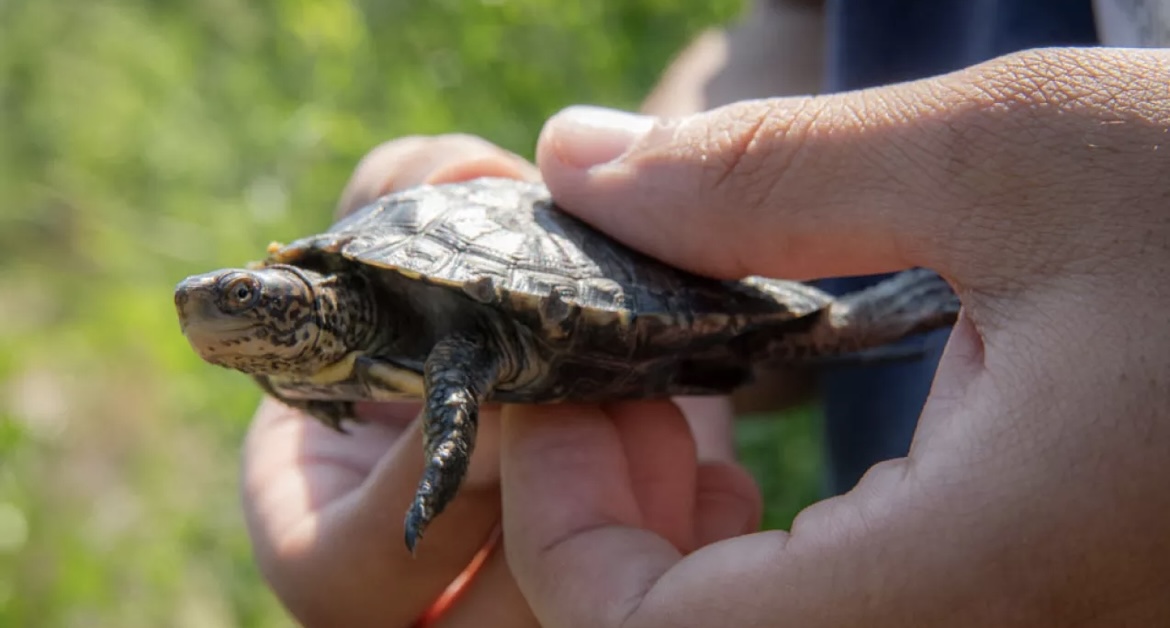
Oct 15 2025 | Abbi Duhart | News Editor
Northwestern pond turtles, one of Oregon’s only native freshwater turtle species, are currently classified as an endangered species in Washington and a threatened species in Oregon. These turtles are unique to the Pacific Northwest and it would be a devastating loss if they were to go extinct. Biologists are working to preserve them, and have had success so far, but they call on residents of the Pacific Northwest to be on the lookout, so together the extinction of this species can be prevented.
The northwestern pond turtles used to be very common from Baja California to Puget Sound, but have become increasingly lower in numbers. By 1990 only two pond turtle sites were left in Washington, encompassing fewer than 100 turtles. Since then, biologists at the Oregon Zoo partnered with the Department of Fish and Wildlife in 1998, and have worked hard to increase populations up to six sites established from Puget Sound to the Columbia River Gorge.
This species faces many threats to their survival, including habitat loss, shell disease and invasive predators and plants. Their natural habitat is slowly decreasing due to the draining and filling of wetlands and the building of dams. Both decrease the water area that these turtles need to build their nests and lay eggs. Additionally, the northwestern pond turtle suffers from a shell disease that leads to paralysis and death in the later stages. Currently, scientists don’t have a lot of information regarding the disease and are focusing their efforts on keeping the turtles safe from predators. Invasive species that threaten these turtles include American bullfrogs and largemouth bass because they often eat turtle hatchlings before they can grow. Invasive plants also threaten them because plant growth limits areas where turtles can dig nests to lay eggs.
Biologists at the Oregon Zoo are helping northwestern pond turtles first by monitoring their nests and fencing them off with wire so that predators can’t get to them. Once the baby turtles hatch, they collect them and take them to the Oregon Zoo to live. The turtles stay at the zoo for around a year, at which point they are released back into the wild. After a year, they are large enough that predators like the bullfrogs can’t eat them and they are safer in the wild. These tactics have proven effective, as the turtle population has been slowly rising since 1990.
While biologists at the Oregon Zoo are working hard to protect the native turtles, they also list some ways that residents of the Pacific Northwest can help. The primary way is by reporting turtle sightings. This can be done through an online tool listed on the Oregon Zoo website. The website where residents can submit a sighting was developed by Western along with Port of Portland and Oregon Native Turtle Working Group. If residents see a turtle to report, the Oregon Zoo urges that they take pictures without disturbing or moving the turtle. After submitting a picture through the website, they would then drop a pin on a map provided to give the approximate location, try to identify the turtle by pictures and options listed, and finally leave their contact information in case biologists need to follow up.
If residents see a turtle trying to cross the road that is in danger of being hit, they are advised to move the turtle to the other side of the road in the direction it was going. Unless they are in danger, the Oregon Zoo asks that people not move turtles even if it appears they are lost. Ultimately, the turtles know where they are going and are likely looking for a spot to dig a nest. If a turtle must be moved, don’t turn it in a different direction, because it will get confused and likely lost.
The survival of the northwestern pond turtles continues to look hopeful as biologists work to restore populations around the Pacific Northwest. When needed, residents of Oregon and Washington can be a part of this rehabilitation and should follow the steps listed to help save the northwestern pond turtles.
Contact the author at howlnews@mail.wou.edu

